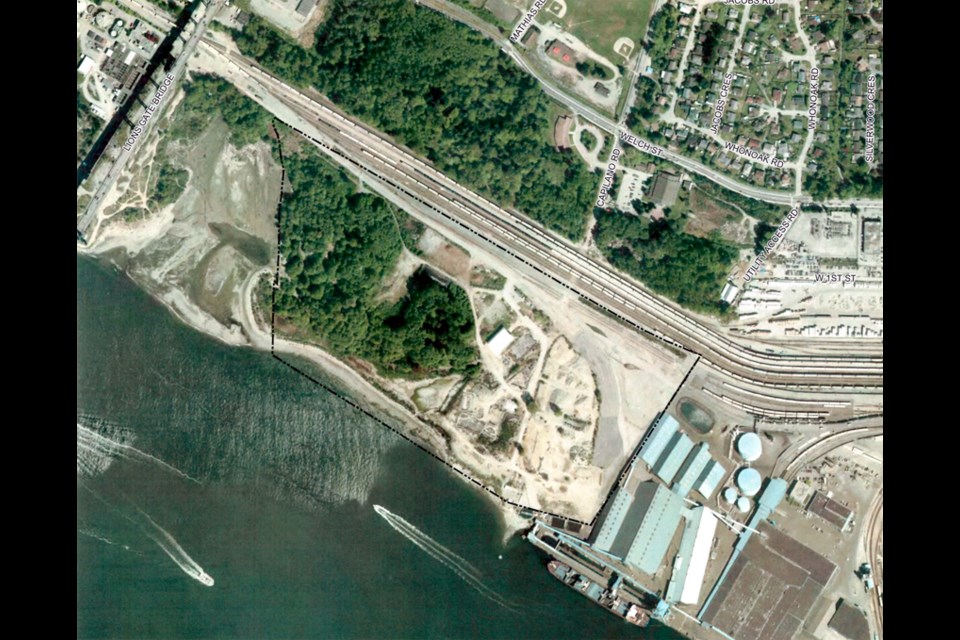A member of the Sḵwx̱wú7mesh Úxwumixw (Squamish Nation) who says he is a hereditary chief was in B.C. Supreme Court this week, requesting an injunction in an unusual case that seeks to reassert authority of the Capilano Indian Band – one of the historical Indigenous groups that now make up the Squamish Nation – over their ancestral land.
Don Mathias filed the injunction in January of this year, requesting that the Squamish stop work on a waterfront parcel of land adjacent to the Lions Gate Bridge, and alleging bulldozers have been tearing up the area, which is culturally significant to the Capilano people.
In court documents filed in the case, Mathias suggested the work near the Lions Gate Bridge is being done to develop the Burrard Inlet Rapid Transit Project.
Lawyers for the Squamish Nation have argued there is nothing out of the ordinary going on at the site, where environmental remediation work has been underway for decades, noting there is no activity happening connected with any kind of transit plan. They also noted Mathias’s earlier court case against the Squamish Nation – requesting that the nation established in 1923 essentially be “de-amalgamated” – has already been tossed out by another judge.
The request for an injunction was filed in January after Mathias discovered over Christmas that a huge bulldozer had “flattened” an area of X̱wemelch’stn (Capilano 5 reserve) near the Lions Gate Bridge, containing trees culturally significant to the Capilano, said Mathias’s lawyer Andrew Rogerson.
Rogerson said Mathias is appealing the January decision of B.C. Supreme Court Justice Shelley Fitzpatrick, which rejected his request to quash a 100-year-old amalgamation of several Indigenous groups into the Squamish Nation. Fitzpatrick ruled at that time the court had no jurisdiction to hear the case.
Rogerson asked this week that an injunction on work being done on the Capilano reserve land be granted until that appeal can be heard in the fall.
Squamish Nation lawyer Robert Janes told the judge there’s no basis to issue an injunction.
The work going on at the site is on land that has been under long-term lease to the federal government, said Janes.
The federal government has been conducting environmental remediation work on the site since the 1990s (when authorities discovered the site was contaminated by heavy metals), Janes noted, without any complaints or requests for an injunction.
Janes added the Burrard Inlet Rapid Transit project for the North Shore is still in the discussion phase and hasn’t been approved or funded. Even if it was approved, the project does not pass through the Capilano reserve, Janes said. Instead, the plan calls for the possibility of a rapid transit route that goes north of Squamish Nation lands and crosses Burrard Inlet at the Second Narrows.
“You can’t get an injunction against work that's not being done,” said Janes in court. “And you can't get an injunction that you haven't sought, against work that's being done by someone else, somewhere else.”
Granting an injunction against any work being done on the Capilano reserve would interfere with both the ongoing environmental remediation and with the development of housing for the Squamish Nation and infrastructure associated with the Park Royal shopping centre, said Janes.
“Some of the complaining that underpins this has been going on since the 1940s,” Janes added. “I think there's barely a community in the world where people are not unhappy about decisions that are made by their government.”
In court documents filed in the case, Squamish Nation spokesperson Khelsilem wrote Mathias isn’t recognized as a hereditary chief by the Nation and has no right to be consulted about what happens on the reserve lands.
Some of the arguments in the case this week closely resembled those previously made in Mathias’s original case against the Squamish Nation, described by Justice Shelley Fitzpatrick in January as a request by the Capilano to "divorce" the Squamish and operate with its own assets and funds.
Fitzpatrick ruled in January that as Ottawa made the legal agreement joining a number of bands into the Squamish Nation almost 100 years ago, the issue would have to be heard in Federal Court.
An appeal of that decision could take place in the B.C. Court of Appeal in September.
Justice Carla Forth reserved her decision on the injunction.
[email protected]
twitter.com/JaneSeyd


